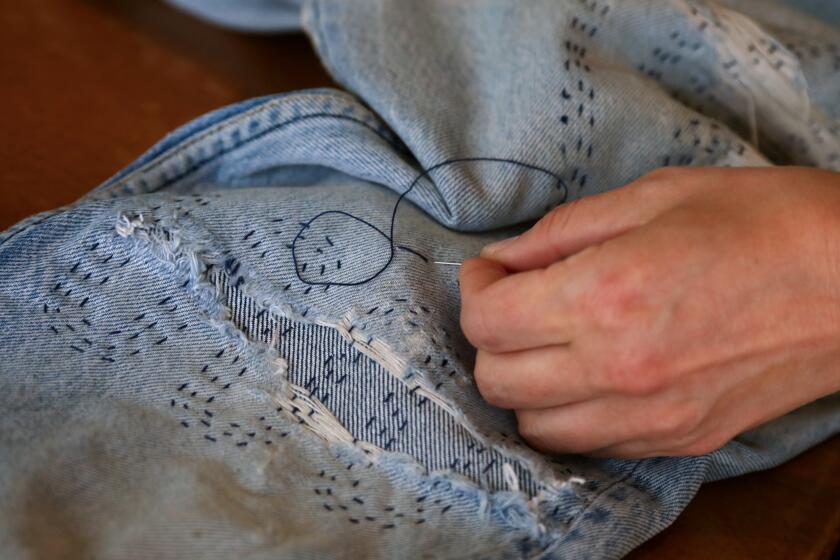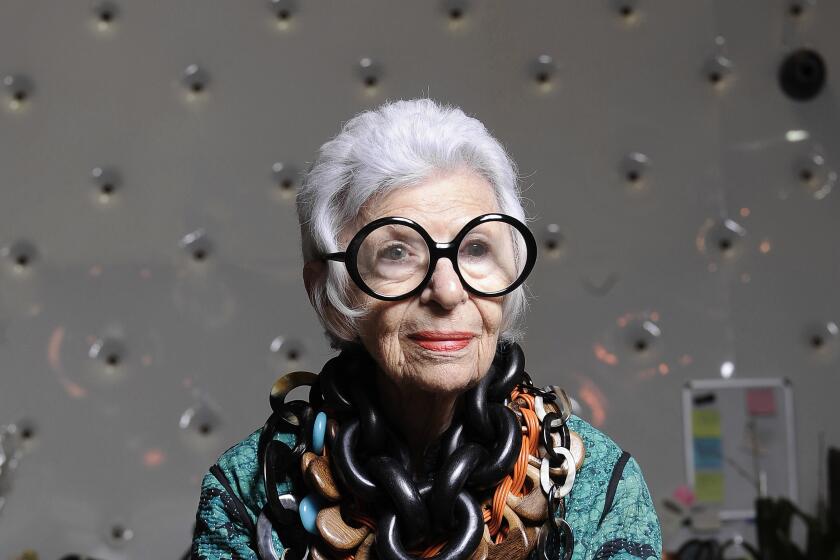The Market Is Getting Tight for High-End Jeans
Prices show few signs of easing, buyers say they won’t back off, and analysts are left to wonder whether the bubble is going to burst.
The commodity in question? Not Southern California housing but premium jeans -- frayed, faded or ripped, and sometimes all three, selling for upward of $400.
Helping to fuel the frenzy is True Religion Apparel Inc., a Los Angeles company that would be happy to burst all that bubble talk. Three years after its start-up, the manufacturer has become the No. 2 premium denim brand in the United States. Now True Religion is continuing its expansion with the opening of its first store, in Manhattan Beach, this month.
Growth has been swift. The company projects that sales will pass $100 million this year and reach $136 million in 2006. Its stock price has doubled this year, closing Friday at $16.44, up 8 cents.
True Religion, through its early success and potential vulnerability, provides a window into the premium denim industry, which is dominated by Los Angeles County companies. The niche is populated with brands such as 7 for All Mankind, the top seller, as well as Citizens of Humanity and Chip and Pepper.
Wholesale revenues in the premium denim segment, still only a small fraction of the overall jeans market, have doubled this year to about $1 billion, said analyst Vera Van Ert of Wedbush Morgan Securities Inc. in Los Angeles.
The action at the retail level continues to sizzle, but “the question is: Is that a trend that can keep on going?” said analyst Eric Beder of Brean Murray, Carret & Co.
Those who sell the jeans say the premium prices are justified because the denim is top quality and the pants are painstakingly hand-finished by workers who sand them to the perfect shade, fray pockets and hems with grinders and sometimes stitch on patches in unique patterns.
“It’s very expensive to do that,” said Jeffrey Lubell, True Religion’s chief executive and co-founder.
The premium denim market has grown in the last five years by tapping into what industry analyst Marshal Cohen of NPD Group calls the “fanatical behavior” of teens and young women seeking that perfect pair of jeans.
Amy Robinson, 26, who stopped by the True Religion Brand Jeans store on a recent Friday, described premium jeans as “the cool thing.”
“It’s like an iPod,” said Robinson, a student who lives in Newport Beach. “If you’re cool, you have a $200 pair of jeans.”
Lubell, 49, makes no apologies for the price of his jeans, which he says are aimed at luxury customers.
“They like something, they buy it,” he said.
In the Manhattan Beach store, the most expensive pair, at $460, has holes in the knees and a snakeskin patch on the back. A pair of jeans for a little girl -- a replica of what her mother might wear, with heavy stitching and shiny copper rivets -- goes for $143.
Lubell logged 25 years in the textile industry, selling fabrics to California apparel manufacturers. In 2002 he and his wife, designer Kymberly Gold-Lubell, now 39, decided to form a company to make premium jeans. The couple, who live in Malibu, had a background in denim, having helped launch the Hippie Jeans and Bella Dahl brands.
Jeffrey Lubell took his first collection -- men’s jeans that featured colored stitching, oversize pockets and twisted seams -- to the Ron Herman store on Melrose Avenue in Los Angeles in 2002. Initially, Lubell said, the buyer was unimpressed.
“After about a half-hour I wore her down,” he said, “and she bought about 24 pair.”
When the $178 jeans at first failed to sell, Lubell began giving them to the store’s salespeople, who wore them to work, a tactic that caught shoppers’ attention. To build word of mouth, he even gave away his wares to people on the street.
From there Lubell won over other luxury retailers, including H. Lorenzo in West Hollywood, Barneys New York and Neiman Marcus.
To maintain its cachet, True Religion has kept supply tight, said Jana Rangel, who directs the brand’s U.S. distribution. The 1.2 million pieces of clothing sold this year -- 85% of them jeans -- were funneled to boutiques and high-end department stores, such as Nordstrom, Bloomingdale’s and Saks Fifth Avenue, in a way she describes as “very calculated.”
“I liken it to caviar,” which wouldn’t seem like such a delicacy if it were ladled from a mixing bowl, Rangel said. “You always want to leave people asking for more.”
True Religion’s big break, analysts say, came in connecting with celebrities such as Jessica Simpson and Cameron Diaz, who appeared in magazines wearing the jeans.
“People look at US Weekly and see what Paris Hilton is wearing coming out of Kitson on Robertson Boulevard,” analyst Van Ert said.
But to many of the young women who buy them, what separates True Religion from the pack is styling. Seams that twist inward on its Joey jeans are meant to give the illusion of thinner legs. Low flap pockets on the rear are designed to make the bottom look perkier.
“It’s all about the butt,” said Charles Lesser, True Religion’s chief financial officer.
Said Jessica Smith, 30, a saleswoman from Hawaii who was shopping at the Manhattan Beach store: “It doesn’t fit like a pair of jeans that cost 40 bucks.”
Premium denim has become a status symbol for many young men as well. Shopper Josh Maunu, an interior designer from Brentwood, said he owned at least 20 pairs.
“That’s all I wear is jeans,” said Maunu, 23. “It’s an investment.”
Even as True Religion expands -- and considers opening stores in San Francisco, Las Vegas and New York -- some observers question how long shoppers will keep shelling out big bucks for big-ticket britches. Many frame the discussion around words such as “bubble” and “glut.”
“Premium denim is at an all-time high,” said Cohen of NPD Group, “not only in prices but in the number of brands trying to sell the product.”
With so many manufacturers competing, analysts foresee a thinning in the ranks as retailers become more selective about which brands to stock on their shelves.
Analyst Stacy Pak has been on the prowl for a denim glut, monitoring companies to see whether they are being forced to slash prices. Her most recent report on the subject, in August, noted a “particularly troubling” number of markdowns on high-end brands, including Yanuk, Miss Sixty and Paper Denim & Cloth.
Pak, of Prudential Equity Group, also said she saw an increasing number of expensive brands showing up at off-price retailer T.J. Maxx.
And when another expensive apparel trend heats up, $400 jeans won’t look quite so tempting, Cohen said.
Some investors have questioned whether True Religion will be able to expand much beyond the premium denim niche, analysts say.
“People look at it and say it’s a one-hit wonder and it’s just going to fall off the face of the planet,” said analyst Karen Short of Fulcrum Global Partners. But the company has created demand for some new products, such as quilted vests and velvet pants and blazers, said Short, who rates the stock a “buy.”
Although confident that demand for its premium denim will continue, True Religion is hedging its bets. The company recently started shipping a casual fleece apparel line of sweatshirts and sweatpants, which Van Ert of Wedbush Morgan said would be an important “litmus test.” The analyst rates the stock a “hold.”
“That’s our first real step into diversifying into a knit collection as well,” Lesser, the company’s finance chief, said of the line of sweats.
“We think that will dramatically change the perception that it’s just a premium denim company.”
In any case, the True Religion store is making an impression in its first few weeks of operation.
“People are obsessed with them,” said Rijel Glasebrook, assistant manager of the nearby Papyrus stationery shop. “I see True Religion jeans in here all the time now.”
But Glasebrook, a 24-year-old Santa Monica resident, hasn’t joined that crowd, noting that the jeans weren’t long enough for her 5-foot-11 frame.
“I buy Gap jeans,” she said. “On sale.”






